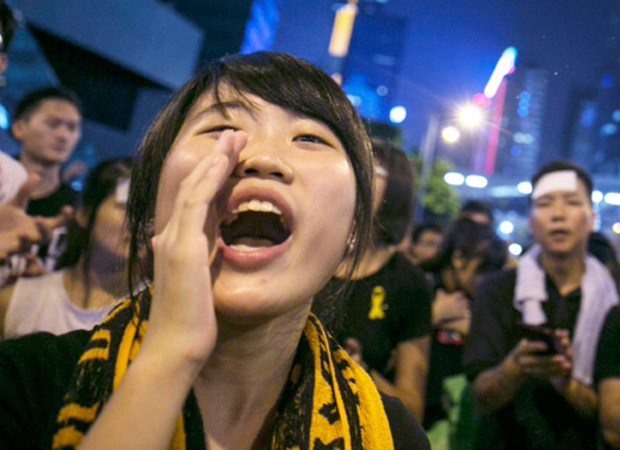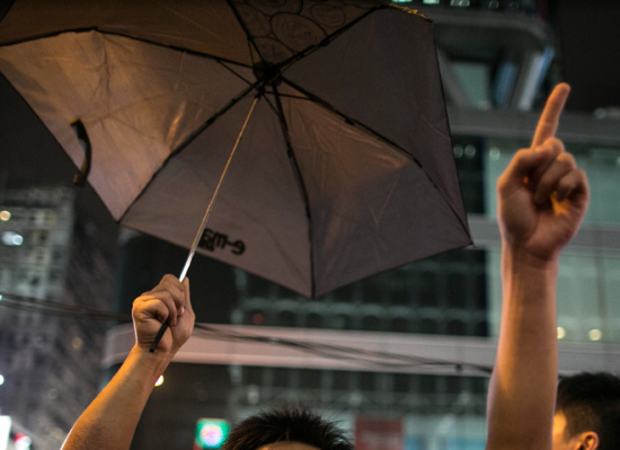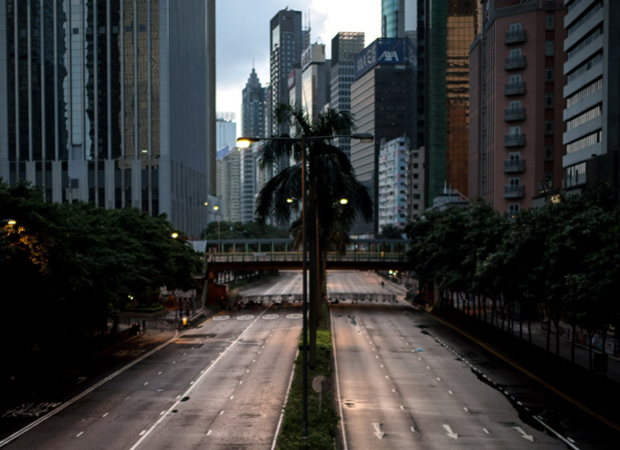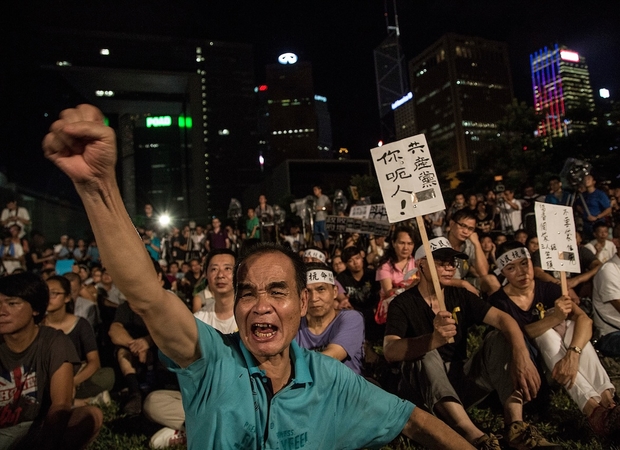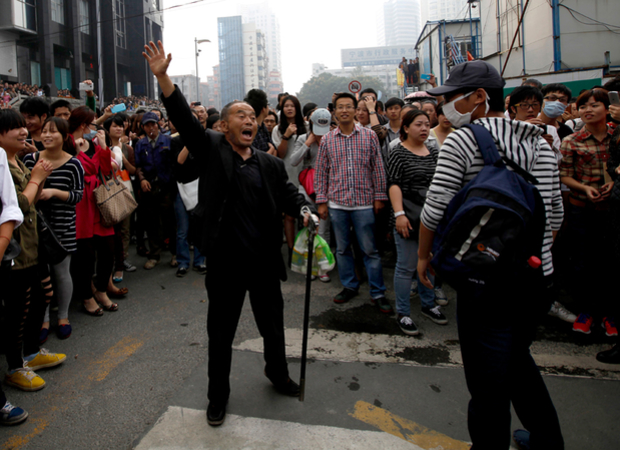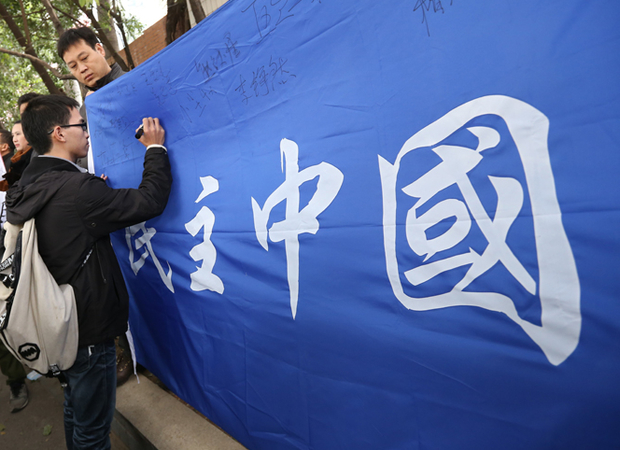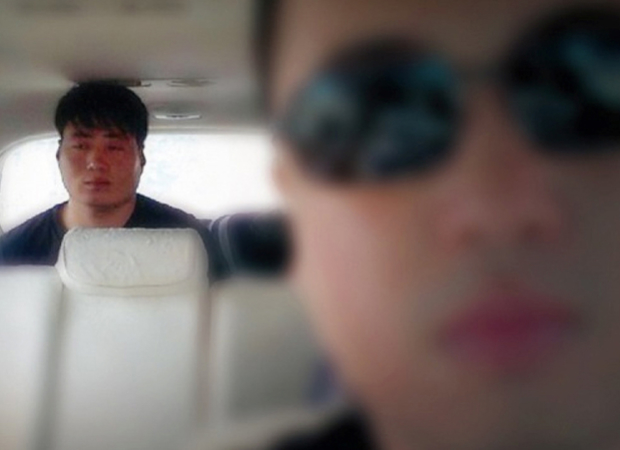China Detains Poet Wang Zang and 7 Others Ahead of Hong Kong Event
On Sept. 30, Wang Zang had posted on Twitter a picture of himself raising his middle finger and holding an umbrella, a symbol of solidarity adopted by the protesters demanding open nominations for Hong Kong's chief executive.
Protests in Hong Kong: Three Things to Know
Former Los Angeles Times Beijing bureau chief Barbara Demick tells us the Hong Kong protests are Not Tiananmen, show Broken Promises and reveal Hong Konger's Basic Complaints.
A Cinematic Context for Hong Kong’s Turmoil
Hong Kong’s film industry, commercial and broad-based as it is, has always provided a mirror of the territory’s political anxieties, and a record of its complex history.
Hong Kong Protests
"The People's Republic of Amnesia" author Louisa Lim talks with Stephen Colbert about the growing civil unrest in Hong Kong and China's efforts to contain it.
Read the Anti-Hong Kong Rant That’s Going Viral in China
Hong Kong's real problem is that most people have no awareness of changing patterns of development, and thus are not psychologically prepared for economic restructuring.
Hong Kong Protesters Promise to Keep Up Occupation
The student federation said it would not end the protests as no progress had been made on political reform and because the police had yet to address their handling of violent attacks on protesters.
Hong Kong Isn’t the Only Protest Chinese Leaders Are Worried About
Hong Kong’s democracy movement could jeopardize one of China’s main goals: weiwen, or maintenance of stability. For more than a decade the government has been defusing labor unrest.
What China Promised Hong Kong
The peaceful demonstrators in Hong Kong, with their umbrellas and trash bags, will not be swept off the streets like garbage or bullied into submission by tear gas and pepper spray.
Hong Kong Celebrities Largely Mum on Protests Gripping City
Hong Kong celebrities are known for their omnipresence and outspokenness, but the city's galaxy of stars and starlets has been almost entirely out of sight during the pro-democracy sit-ins.
In Hong Kong Protests, Both Sides Are Wondering How This Will End
As many thousands of Hong Kong residents kept up their occupation of the streets Wednesday night, leaders on both sides began strategizing with an eye toward the endgame.
China Issues Warning Over Hong Kong ‘Illegal’ Protests
China's Foreign Minister Wang Yi, visiting Washington, also warned that the matter was an "internal affair" for China.
Full Text of the Chinese Communist Party’s Message to Hong Kong
"Cherish Positive Growth: Defend Hong Kong’s Prosperity and Stability," People’s Daily, October 1, 2014, translated by Quartz.
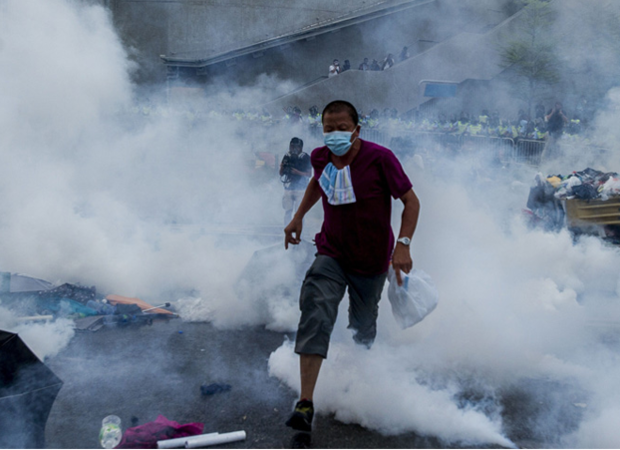
Is This the End of Hong Kong As We Know It?
Over the past week, tens of thousands of Hong Kong people have occupied the streets of their semi-autonomous city to advocate for the democratic elections slated to...
The Hong Kong Protests in Pictures
As thousands of people remain on the streets of Hong Kong, even after local police tried to disperse their protests with hoses and tear gas, here is a collection of images of how the protests—that are calling for greater democracy in Hong Kong—...
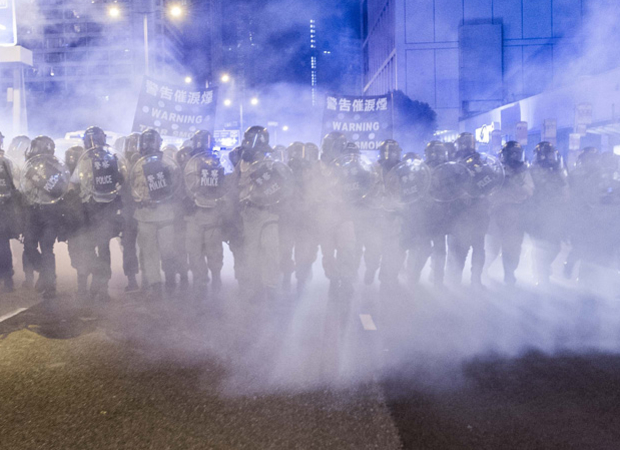
The Day that China Came to Hong Kong
Hong Kong’s massive protests should have surprised no one. A bitter debate over political reform split the city. Beijing’s high-handed diktats deepened the anger. Before the protests, the question was whether or not the vast majority of this city...
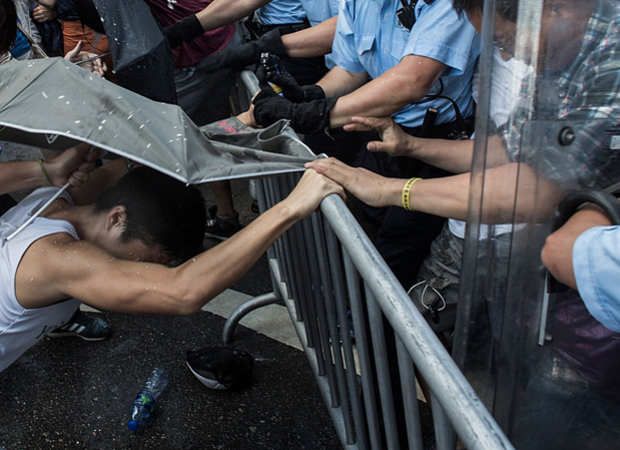
‘Against My Fear, I See That You Hope’
A week ago today I sat together with you outside the Chinese University of Hong Kong’s library, a teacher among other teachers, a university member beside students, 13,000 strong. The weeks before had felt quiet: at the three previous all-student...
Police Unleash Tear Gas in Hong Kong Protests
In a significant escalation of their efforts to suppress protests calling for democracy, the authorities in Hong Kong unleashed tear gas and mobilized riot police with long-barreled guns Sunday to disperse crowds that have besieged the city...
At least 34 injured as police and protesters clash in Hong Kong
But as Sunday became early Monday, it appeared many of the protesters were set to continue to jam streets of the business district. The sometimes violent demonstrations follow a week of student-led boycotts and protests against what many...
Hong Kong Democracy Protesters Enter Government Complex
Students and activists have been protesting against a decision by Beijing to rule out fully democratic elections in Hong Kong in 2017.
Hong Kong Students Lead Democracy Fight With Class Boycott
Thousands of Hong Kong university students abandoned classes on Monday to rally against Chinese government limits on voting rights, a bellwether demonstration of the city’s appetite for turning smoldering discontent.
Hong Kong Tycoons Descend on Beijing for Xi Meeting
Tung Chee-hwa leads 70-strong delegation to Beijing; members come out strongly against Occupy Central, saying don't harm Hong Kong
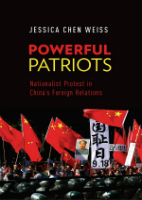
Powerful Patriots
Why has the Chinese government sometimes allowed and sometimes repressed nationalist, anti-foreign protests? What have been the international consequences of these choices? Anti-American demonstrations were permitted in 1999 but repressed in 2001 during two crises in U.S.-China relations. Anti-Japanese protests were tolerated in 1985, 2005, and 2012 but banned in 1990 and 1996. Protests over Taiwan, the issue of greatest concern to Chinese nationalists, have never been allowed.
Hong Kong’s Democracy Dilemma
In a huge rally on Sunday in Hong Kong, democratic groups already were declaring a new era of civil disobedience.
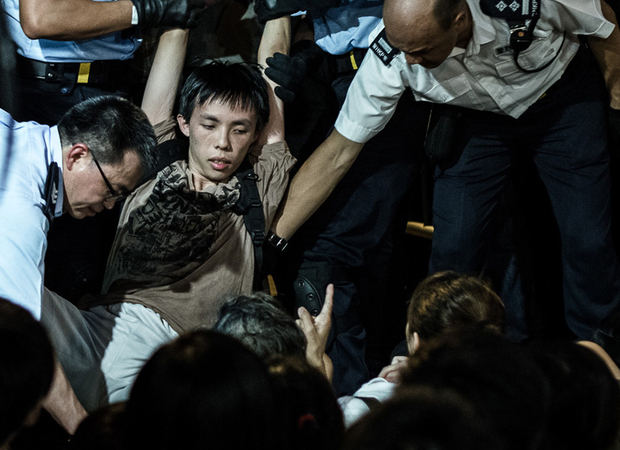
Hong Kong Rising: An Interview with Albert Ho
from New York Review of BooksThe former British colony of Hong Kong reverted to China on July 1, 1997, and on every July 1 since then Hong Kong citizens have marched in the streets asking for democracy. The demonstrations on this year’s anniversary, however, were on a much...
Pro-Democracy Activism Not in Hong Kong’s Interest, China Warns
As potentially hundreds of thousands of Hong Kong citizens prepare to take to the streets in a now-annual display of public disapproval of Beijing’s interference in the city’s affairs, voices in China’s state-run press are warning that the...
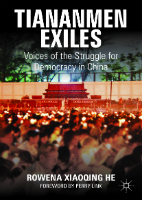
Tiananmen Exiles
In the spring of 1989, millions of citizens across China took to the streets in a nationwide uprising against government corruption and authoritarian rule. What began with widespread hope for political reform ended with the People's Liberation Army firing on unarmed citizens in the capital city of Beijing, and those leaders who survived the crackdown became wanted criminals overnight.
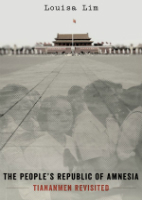
The People’s Republic of Amnesia
On June 4, 1989, People's Liberation Army soldiers opened fire on unarmed civilians in Beijing, killing untold hundreds of people. A quarter-century later, this defining event remains buried in China's modern history, successfully expunged from collective memory. In The People's Republic of Amnesia, NPR correspondent Louisa Lim charts how the events of June 4th changed China, and how China changed the events of June 4th by rewriting its own history.
{node, 5555}
Cairo in Chinese
When Shen Yitong left her home in China to study French at Cairo University in 2008, she didn’t know that she would come to think of Egypt as a second home, or that she would see revolution come upon the country so suddenly. Her parents came from...

‘Staying’—An Excerpt from ‘People’s Republic of Amnesia’
Zhang Ming has become used to his appearance startling small children. Skeletally thin, with cheeks sunk deep into his face, he walked gingerly across the cream-colored hotel lobby as if his limbs were made of glass. On his...
Protestors Torch Factories in Southern Vietnam as China Protests Escalate
Properties in the Vietnam-Singapore Industrial Parks (VSIP) I & II in Binh Duong were targeted by thousands of protesters demonstrating over China's deployment of an oil rig in disputed waters.
Seeking More From Chinese Films
The China Film Directors’ Guild said it would not award a top prize for film or director of the year because Chinese films need to meet “a higher standard,” said director Feng Xiaogang.
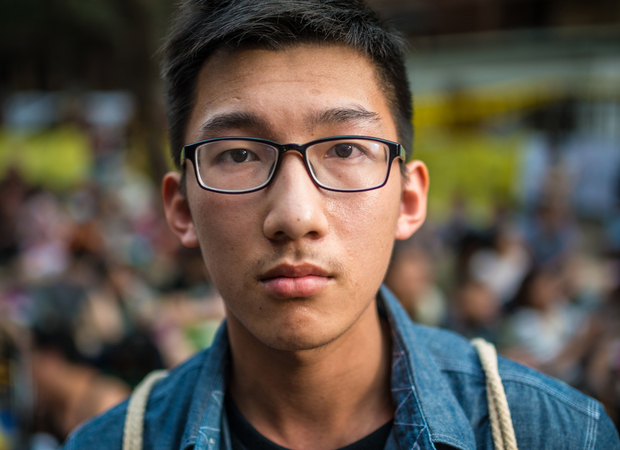
Sunflower Protestors Open Up
On March 18 some 200 Taiwanese, mostly college students, stormed the offices of Taiwan’s legislature, beginning a protest over a proposed trade...
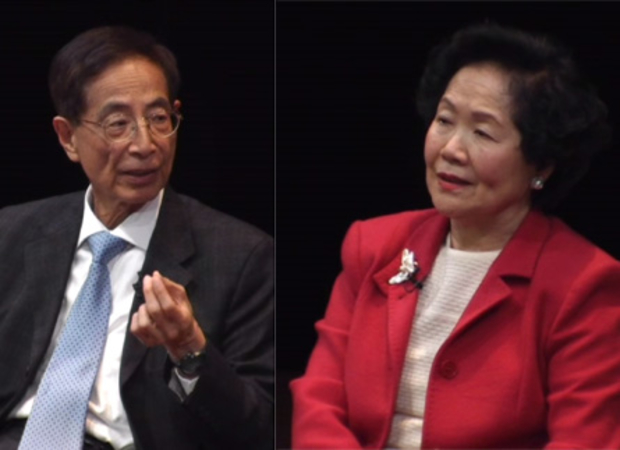
The Future of Democracy in Hong Kong
Jailed Dissident’s Wife: ‘I Don’t Want You to Give Up’
A public letter from the wife of Xu Zhiyong shows the emotional burden imposed on the family members of jailed dissidents.
White House Responds to Jimmy Kimmel’s China Controversy
A joke concerning the killing of Chinese people to avoid paying down U.S. debt was said live on ABC.
It’s O.K. to Protest in China, Just Don’t March
King has just completed two studies that peer into the Chinese censorship machine — including a field experiment within China that was conducted with extraordinary secrecy. The studies refute popular intuitions about what Chinese censors...
Bo Xilai Supporters Demonstrate in Shandong on Eve of Trial
About 10 people held up signs outside the courthouse in the eastern city of Jinan in Shandong province, where Bo is set to appear in public on Thursday for the first time in 17 months to face charges of bribery, corruption and abuse of...
Rare Protest in Vietnam Raises Call to Curb China
An anti-China march in the Vietnamese capital on Sunday showed the domestic pressure the government faces when dealing with Beijing’s muscular approach to territorial claims in the South China Sea.
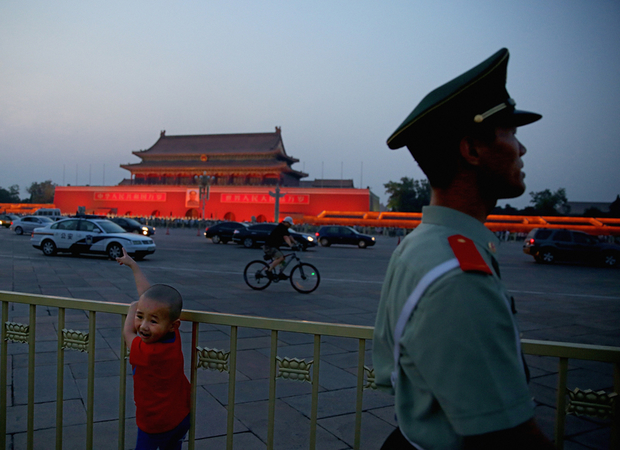
How Would Facing Its Past Change China’s Future?
David Wertime:
The memory of the 1989 massacre of protesters at Tiananmen Square remains neither alive nor dead, neither reckoned nor obliterated. Instead, it hangs spectre-like in the background, a muted but latently powerful...
The Pollution Crisis and Environmental Activism in China: A Q&A with Ralph Litzinger
The last year has seen a dramatic uptick in press coverage of Chinese environmental issues. There have also been a number of books published on the subject, with more due out soon. So this seemed a good moment to get in touch with my friend ...
Chinese Protesters Oppose Petrochemical Plant in Kunming
Today, hundreds of protesters shut down traffic in the ...
China’s First Lady Serenaded Tiananmen Troops
A photo of China’s new first lady Peng Liyuan in younger days, singing to martial-law troops following the 1989 bloody military crackdown...
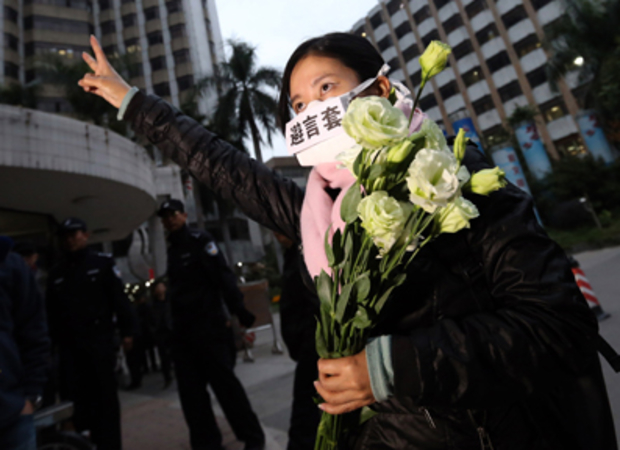
The Southern Drama
from Sinica PodcastMere months after China’s handling of the Eighteenth Party Congress suggested the country would undergo a peaceful leadership transition, the issue of freedom of the press surged to attention this week after a censored editorial in Southern...
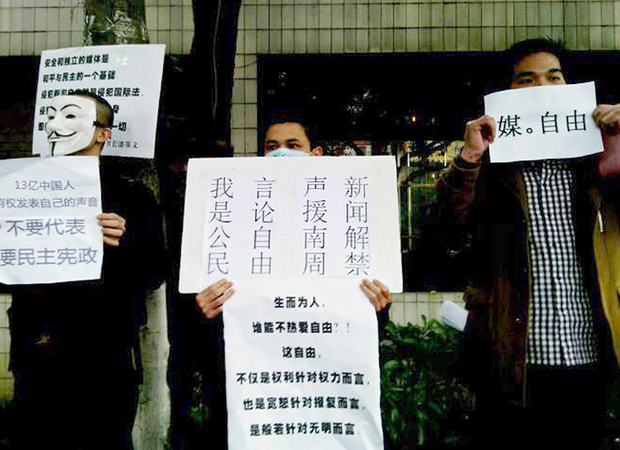
Online and Off, Social Media Users Go to War for Freedom of Press in China
When Mr. Tuo Zhen, the propaganda chief of Guangdong province, rewrote and replaced the New Year’s editorial of the Southern Weekend newspaper without the consent of its editors, he probably did not think it would make much of a splash....

China’s New “Middle Class” Environmental Protests
from chinadialogueChina’s urban residents (or the new “middle class”) protest on the streets only very rarely. Discontent is expressed almost exclusively online, via angry typing. But this has changed over the last five years—protests have come offline and on to...
Standing Their Ground
The forced eviction of people from their homes and farmland has become a routine occurrence in China and represents a gross violation of China’s international human rights obligations on an enormous scale. Despite international scrutiny and...
Protests Roiling, China’s Mainstream Media Showed an Alternate Reality
It’s already entered the annals of China’s brief but rich Internet history: On Sina Weibo, China’s Twitter, posts showing massive anti-Japan protests in China went viral on September 15th and 16th. Out in the real world, protestors across dozens...
After Panjin Killing, Public Deserves to Know
There is growing public skepticism about the veracity of a government report detailing a demolition-related incident in Panjin, Liaoning province, during which a police officer killed a villager for allegedly threatening his life.
...
What the Foxconn Riot Says About China
Day by day, Chinese workers expect better conditions and greater guarantees that when companies go bust, the employees will not. And, yet, China permits no independent trade unions or free collective bargaining. Complaint and mediation procedures...
Still a Model? Revisiting the Rebel Village of Wukan
A little over a year ago, residents of the small southern Chinese fishing village of Wukan ransacked the offices of the local government in protest over a land grab by local officials. The death in police custody of one of the protest leaders a...
Beijing's Dangerous Game
Many have ascribed the vehemence of the protests to deep-rooted anti-Japanese sentiment linked to injustices committed by Japan eighty years ago. But there is little evidence to support this. Rather the protests appear to have everything to do...
Beijing both Encourages and Reins in Anti-Japanese Protests, Analysts Say
As anger increases over a territorial dispute...




